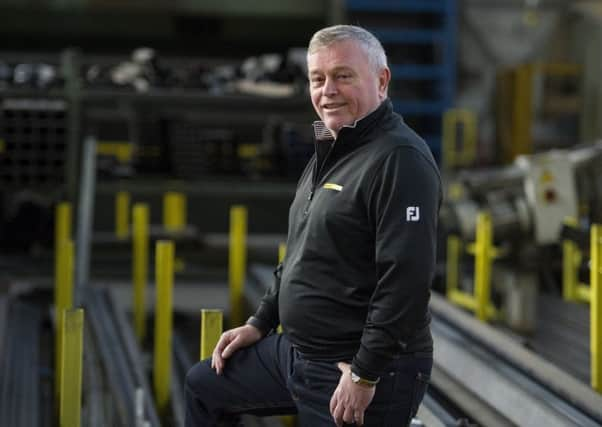Monday interview: Bruce Wishart, managing director at Empteezy
This article contains affiliate links. We may earn a small commission on items purchased through this article, but that does not affect our editorial judgement.


Like many overseas-minded business owners these days, Bruce Wishart is looking beyond Europe for growth abroad – but his push “further afield” is not being driven by the looming spectre of Brexit.
Rather, he is following the expansion of legislation into emerging markets where worker safety and environmental protection are gaining increasing precedence. As more regulations come into force, so demand rises for products made by Empteezy, the manufacturing group he set up in Livingston 30 years ago. “There is a growing realisation that water is a finite resource, even in places like Scotland where so much of it falls out of the sky,” says Wishart after a business trip to the Far East that took in Jakarta, Bangkok and Singapore.
Advertisement
Hide AdAdvertisement
Hide Ad“It is early days but we can see there is a market out there. It is very competitive, obviously, because of China and the fact that many of these products can be copied, though at what quality is a different discussion altogether.”
Reliability is an important factor in Empteezy’s main line of work, which is the production of equipment to help prevent, contain and clean up industrial spills of oil, chemicals and other liquids. Most is made in the group’s four manufacturing plants – two in Livingston and two in France – then moved through its sales warehouses in Belgium, France, Germany, Holland, Italy, Spain, the UAE and the UK.
These operations employ about 230 people, while distributors handle sales into other markets as far afield as Australia. Total revenues generated by the group, which is wholly-owned by Wishart, amounted to roughly £35 million in the latest financial year.
The vast majority of sales, some 95 per cent, are linked to spill containment and clean-up. However, it was an idea for easily offloading waste that led to the company’s formation back in 1986.
Raised in West Kilbride, Wishart says his only real ambition while growing up was to “leave school”. This was in the final days when it was possible to do so at 15, which Wishart did, opting for a job as an assistant at a local garage.
The catch was he hadn’t told his father William, who had a petrol account at the garage where the younger Wishart was expected to fill customers’ tanks. Despite his efforts to evade detection, Wishart’s father quickly realised what was going on. “That was my job over, and I had to go back to school for another year,” he says.
He left home a year later and went to Glasgow, where he worked his way through a series of warehouse and factory jobs in sectors including clothing, recycling and plumbing, and spent ten years working for a local waste paper merchant, where he was general manager of a processing plant.
Advertisement
Hide AdAdvertisement
Hide Ad“But I realised I would probably never go further in the organisation because it was family-owned, and members of the family would always have the top spots,” Wishart recalls. This was around the same time as the low-rise pallet stillage was making way for the large roll-off skip in industrial waste collection.
But at an average height of six to eight feet, getting refuse into the skip was difficult and sometimes dangerous.
“One of the problems was getting the waste from where it was created to the skips out in the yard,” Wishart says. “It was done manually, and it was very costly.”
He came up with the idea for a forklift attachment that could be used to easily empty waste into skips. His employers had no interest in pursuing the idea because it was not part of their core business, so Wishart struck out on his own from a rented Second World War Nissan hut in Broxburn.
Initially produced by sub-contractors, the unique feature of Empteezy containers was a mechanism that automatically opened a door to dump out the refuse. Wishart patented it, giving him a relatively clear run on that market for the next two decades.
But after bringing manufacturing in-house, he wanted to add other products that could be made through the same process. Noting the introduction of environmental regulations in the US and Germany in the early 1990s, he determined it was only a matter of time before the same would take hold in the UK and elsewhere.
That “took longer than I expected”, Wishart says, but in the meantime Empteezy completed a majority buy-out of French fabrication company Delahaye in a move that cemented its presence outside the UK.
France remains the group’s biggest market, accounting for about half of sales. While Empteezy is encountering the same issues as others with currency fluctuations, Wishart says he has yet to see any other serious impact on business as a result of Brexit.
Advertisement
Hide AdAdvertisement
Hide Ad“The politicians make changes, and businesses have to adapt to that,” he says.
“There is no point in crying about it – business just has to get on with it. I am sure we will. Good businesses will adapt.”
30 SECOND CV
Born: 1954, Glasgow
Raised: West Kilbride
Education: Ardrossan Academy
First job: Assistant in a motor garage
Can’t live without: Family and friends
Kindle or book? I have both. I travel a lot, so I was an early adopter of eBooks
Favourite city: Edinburgh
Preferred mode of transport: Trains, particularly in Europe
What car do you drive? Maserati Levante
What makes you angry? Rudeness and thoughtlessness
What inspires you? I love what I do, and people have jobs from this company. That is what motivates me